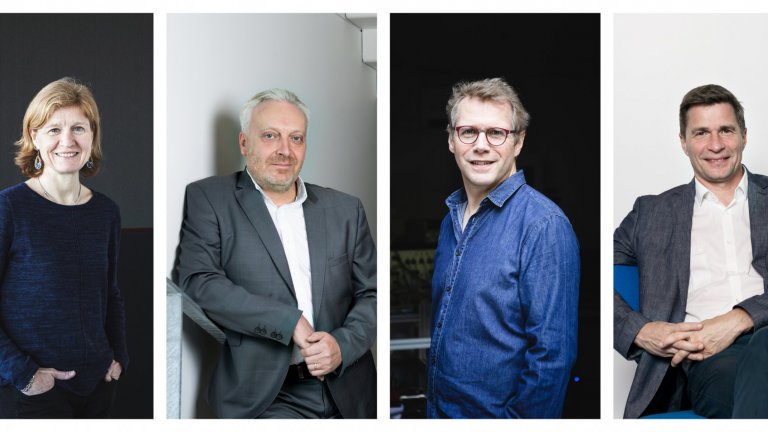
© Frédérique Plas / Cyril Frésillon / CNRS Images
View the mediaScientific news
Sophie Brouard, Daniel Hissel, Arnaud Landragin and Franck Molina are the four recipients of the CNRS 2020 Innovation Medal.

© Frédérique Plas / Cyril Frésillon / CNRS Images
View the mediaCreated 10 years ago, this distinction honours people whose outstanding research has led to significant technological, economic, therapeutic or social innovations that promote French scientific research.
Sophie Brouard, a veterinary surgeon by training and now a Research Director, became interested in the issue of graft rejection, and is focusing on how to reduce the aggressive anti-rejection treatment that causes many side effects. With 163 scientific publications and 13 patents to her credit, she has founded two companies: TcLand Expression, for biomarkers, and Effimune, subsequently known as OSE Immunotherapeutics, which develops therapeutic tools against cancer and auto-immune diseases.
Daniel Hissel, a professor and researcher, conducts real-time diagnostics of hydrogen fuel cells to increase performance and extend their lifespan. He also designs algorithms to optimise hybrid systems, which combine batteries, supercapacitators and hydrogen fuel cells. The start-up, H2SYS, which he co-founded in 2017, is now successfully capitalising on his research. It employs ten people in Burgundy Franche-Comté and continues to expand.
Arnaud Landragin is a Research Director who uses quantum principles to split an atom into two waves. Gravity modifies the propagation of the waves and can be calculated after their recombination. He designed cold-atom absolute gravimeters using this technology, which are sold by the company, Muquans, that he co-founded. This research has applications in the geosciences, in the measurement of acceleration and gravity fields, or in probing fluids and materials present in the sub-soil. Due to this research, the French scientific community is very well positioned in the field of “quantum sensing”, with the aim of developing a new generation of sensors by 2030 that fully uses the entanglement properties afforded by quantum physics.
Franck Molina, Research Director, has moved from modelling biological systems, such as cells, to producing them. Using synthetic biology, he has managed to design and programme artificial cells, such as biomachines, to carry out non-natural tasks. They are used as ultra-fast diagnostic tools for diabetes and to detect pesticides. Some of his research – on solutions for liquid biopsies, psychiatric illnesses, or the almost instantaneous sexing of chicken eggs – has been the subject of many industrial transfers to companies such as Skillcell, BioRad, Alcediag, Tronico or DiaDx.
The careers of these four winners of the 2020 CNRS Innovation Medal demonstrate the quality, variety and breadth of research conducted at CNRS, as well as the different ways of exploiting it. They also show that even very basic research can lead to the foundation of companies or be followed by transfers to the business world.
Our work is guided by the way scientists question the world around them and we translate their research into images to help people to understand the world better and to awaken their curiosity and wonderment.